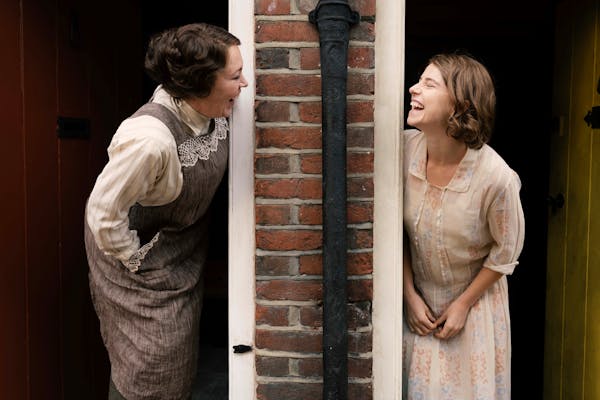Alex Garland said "Civil War" may be the last movie he'll direct and I get it. It cannot have been easy to spend years in the headspace required to make this upsetting film.
Its subject should upset us: armed insurrectionists seceding from the U.S. and fighting to take over the nation's capital. "Civil War" stays deliberately vague about politics — we don't know the beliefs of the president, who's played by Nick Offerman, or the people planning to murder him. What we do know is that one-third of the nation seems to be involved in the overthrow, one-third is pretending it isn't happening and the remaining third is photo- and video-journalists who document the chaos.
That third group is the one "Civil War" is interested in, and is led by Kirsten Dunst as Lee, a weary veteran photographer. She and reporter Joel (Wagner Moura) are driving to Washington, D.C., hoping to interview the president. Accompanying them are an older journalist (Stephen McKinley Henderson) who's been a mentor to Lee and Jessie, a wide-eyed photog wannabe (Cailee Spaeny, unrecognizable from her title role in "Priscilla"). Initially, Jessie seems to be "All About Eve"-ing Lee but it's really more of a "The Devil Wears Prada," passing-the-torch-to-the-next-generation situation.
The complex, wary relationship between the women grounds the first half of the movie. Garland — whose movies include "Men" and "Ex Machina" — exhibits his growth as a filmmaker in the mounting suspense of "Children of Men"-like set pieces, in which the journalists seem to be rolling along, only to discover they've driven into jeopardy, again and again.
There's a particularly gripping scene that makes use of that staple of suspense, the character you forgot was part of a scene who suddenly roars back in to save the day. Basically, any moment in "Civil War" that feels benign, where you can hear birdsong or see a Christmas tree, means something really bad is about to happen.
Having invested us in the difficult world of war photographers, who balance compassion with the emotional distancing required to do their jobs, "Civil War" ends up whiffing on that topic. Dunst does what she can to convey how much her work has cost Lee, but her struggles, and Jessie's dawning awareness of them, get lost in the violent second half. (Perhaps the upcoming "Lee," in which Kate Winslet plays the real-life war photographer for whom we're told Dunst's character was named, will tackle that.)
In the second half, "Civil War" becomes what its title promises. Loud, bloody and relentless, the final scenes are difficult to watch precisely because Garland has shown us the differing worldviews the journalists bring to them. Some aspects of these scenes are hard to swallow; would insurrectionists really embed journalists with them as they descend on the White House? But the raw, up-close footage is so immersive that, in the moment, I bought it.
Garland's lean, understated screenplay trusts us to figure out much of what's going. Visually, he leans on the beauty of the East Coast in summer, which contrasts with the ugliness of the capital (until D.C., almost all of the movie is in bright sunshine). And he makes clear what heroes photographers are, placing themselves in danger to get at the truth. Or, as Lee says, "We record, so other people ask."
'Civil War'
*** out of 4 stars
Rated: R for brutal violence and strong language.
Where: In theaters.

Lose yourself in these new immersive Las Vegas experiences
Streetscapes

Critics' picks: The 12 best things to do and see in the Twin Cities this week


